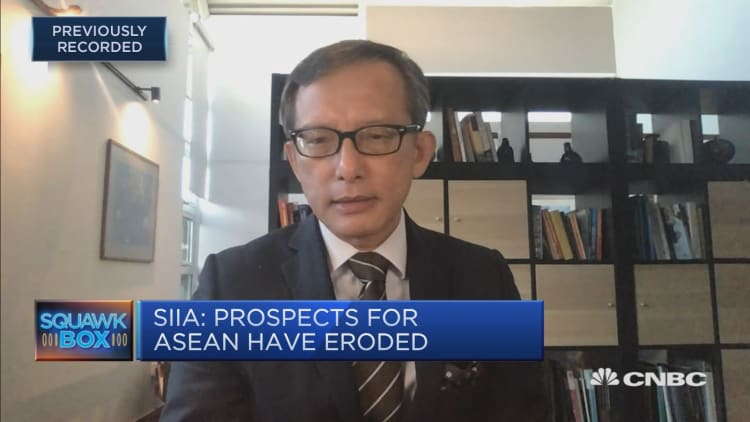Political uncertainties in several Southeast Asian countries are coming to the forefront again, which could threaten their recovery from the coronavirus pandemic, an expert said on Friday.
Some of those uncertainties took a backseat when authorities around the region imposed lockdowns of varying degrees to slow the spread of the coronavirus. As those measures are gradually lifted and domestic politicking resumes, the stability of some governments are in question once more, said Simon Tay, chairman of think tank Singapore Institute of International Affairs.
"There is a concern that without political will and unity, some countries are going to be much worse off. It's not a health concern, this is really economic, governance et cetera," he told CNBC's "Squawk Box Asia."

Tay, who's also a law professor at the National University of Singapore, cited Malaysia as an example of a country where politics could hamper its recovery. The country had a change in government shortly before it entered a lockdown in March — following defections from the former ruling coalition that resulted in its collapse.
But the stability and legitimacy of the new government has come under question, with several media outlets reporting that a snap election could soon be called for the current ruling coalition to seek a new mandate.
"There are lots of different politicking about small issues but it adds up to a big question mark about the political stability and the political attention to dealing with both economic and other (issues)," said Tay.
"And Thailand next door — large economy for our region — they're having the same problem: the economic team is gone, another's being ushered in. But the contraction of the economy is very real, very now," he added.
"There is a concern that without political will and unity, some countries are going to be much worse off.Simon Tay
Several Thai ministers resigned last month, including the country's key economic architects. New ministers have reportedly been appointed but the change has come at a time when the tourism-dependent Thai economy is slammed by the coronavirus pandemic, which brought global travel to a halt.
Malaysia and Thailand are among Southeast Asian countries that have reported a slowdown in daily new Covid-19 cases, according to data compiled by Johns Hopkins University. Covid-19 is the official name of the coronavirus disease.
Still, some economists warned that most countries in the region would still find it challenging to grow their economies given the global uncertainties — regardless of their success in containing the outbreak.
Earlier this week, Nomura's chief Asean economist, Euben Paracuelles, said the region could experience a "U-shape" recovery at best. A U-shape recovery typically means an economy spends a longer time at the bottom of a recession before it gradually rebounds.


